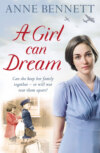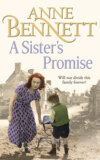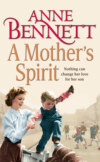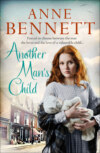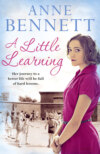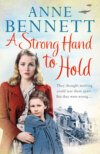Czytaj książkę: «The Child Left Behind»
The Child Left Behind
Anne Bennett

This book is dedicated to my sister in lawKathy Flanagan, with love and in memoryof my brother Shaun, who tragically diedon 5th March 2009 RIP.
Table of Contents
Cover Page
Title Page
Dedication
ONE
TWO
THREE
FOUR
FIVE
SIX
SEVEN
EIGHT
NINE
TEN
ELEVEN
TWELVE
THIRTEEN
FOURTEEN
FIFTEEN
SIXTEEN
SEVENTEEN
EIGHTEEN
NINETEEN
TWENTY
TWENTY-ONE
TWENTY-TWO
TWENTY-THREE
TWENTY-FOUR
TWENTY-FIVE
TWENTY-SIX
TWENTY-SEVEN
TWENTY-EIGHT
TWENTY-NINE
THIRTY
Author’s notes
ACKNOWLEDGEMENTS
By the same author
Copyright
About the Publisher
ONE
Finn Sullivan couldn’t understand his family. They had been aware of the rumblings of an unsettled Europe and so why were they surprised when Britain declared war on Germany on 4 August 1914? When the news filtered through to them, via the postman, in their cottage in Donegal, Finn’s eldest brother, Tom, went to Buncrana, their nearest town, and bought a paper so that they could read all about it.
‘England has declared war on Germany because they invaded two other countries,’ he said as the family sat eating their midday meal.
‘Well, if that’s about the strength of it,’ his father, Thomas John, remarked, ‘it’s a wonder that no one can see the irony.’
‘What do you mean?’ Finn’s brother Joe asked.
‘Well, isn’t that what England has done to us?’ Thomas John said. ‘They invaded us, didn’t they? Who rules Ireland now?’
‘Not the Irish, that’s for sure,’ Biddy, Finn’s mother replied. ‘It’s England has us by the throat.’
‘Aye,’ Thomas John said, ‘and that means anything that involves England automatically involves us too.’
‘You mean the war?’ Finn asked.
‘Of course I mean the war, boy. What else?’
Finn coloured in anger. He hated being called ‘boy’ by his father now he was over eighteen.
‘So you think there will be call-up here?’ Joe asked.
‘Don’t see how we will get away without it,’ Thomas John said.
‘Maybe they are hoping for volunteers,’ Tom said. ‘After all, young Englishmen are volunteering in droves. The recruiting offices are hard-pressed to cope with the numbers who want to take a pop at the Germans. So the paper says, anyway.’
‘And why would Irish boys volunteer to fight for a country that has kept them down for years and years?’ Thomas John demanded.
‘The carrot that they are holding out might have something to do with that,’ Tom said.
‘What’s that?’ Joe asked. ‘Have to be some big bloody carrot, for I would not volunteer to lift one finger to help England.’
‘The paper claims that the government will grant Ireland independence if they get Irish support in this war.’
‘Let me see that,’ Thomas John said, and Tom passed the paper to his father, who scanned in quickly. ‘That’s what it says all right, and I don’t believe a word of it. To my knowledge, England has never kept any promise it has made to Ireland and the Irish. For my money they can sink or swim on their own. We will keep our heads down and get on with our lives. It’s no good seeking trouble. In my experience it will come knocking on the door soon enough.’
Finn couldn’t believe that his father thought their dull, boring lives would go on totally unaffected by the war being fought just across a small stretch of water.
To Finn, war was new and exciting. He knew that in the army no one would look down on him because of his youth and no one there would call him ‘boy’.
He didn’t share these thoughts, but when his young sister Nuala came in from her nursemaid’s job at the Big House and was told the news later, she noted the look on Finn’s face and the zealous glint in his deep amber eyes, and she shivered and hoped that her impetuous brother wouldn’t do anything stupid.
War dominated the papers and Finn read everything he could about it. After the first weeks there were pictures of the first troops to go overseas waving out of train carriages, all happy and smiling. They would soon kick the Hun into touch, the papers said, and be home by Christmas with the job done. Finn looked at the pictures and ached to be there amongst them.
The following Saturday morning, he tripped getting up from the milking stool and spilled half a pail of milk over the straw on the floor of the byre. Thomas John, suddenly angered by the mess, gave him such a powerful cuff across the side of his head that it knocked him to the floor, although he had never raised his hand to any of his children before.
No one helped Finn to his feet and he was glad, because he would have hated his brothers to see the tears he brushed away surreptitiously.
‘Don’t worry about it, Finn,’ Tom said quietly as they walked back to the house. ‘You know Daddy’s temper flashes up out of nothing and is gone in an instant. He will be over it in no time.’
But I won’t be, Finn thought, but he said nothing.
When he set out for Buncrana later that morning with Tom and his mother, he was as angry as ever. This anger was increased as Biddy took out her purse as they pulled into the town and, dropping some coins into Finn’s hand, told him to go to the harbour and buy some fish for their dinner.
Finn never got to the harbour, however, because as he turned down Main Street he heard a military band and saw the line of soldiers at the bottom of the hill. In front of this company was a tall officer of some sort, in full regalia, and so smart, even the buttons on his uniform sparkled in the early autumn sunshine. He held a stick in his left hand.
Suddenly the band behind him began to play and the officer led the soldiers up the hill to the marching music, the beat emphasised by the young drummer boy at the front. The officer’s boots rung out on the cobbled street, the tattoo of the soldiers’ tramping feet completely in time.
Shoppers and shopkeepers alike had come to the doorways to watch the soldiers’ progress. As they drew nearer, though, Finn was unable to see the officer’s eyes, hidden as they were under the shiny peak of his cap, but his brown, curly moustache fairly bristled above the firm mouth in the slightly red and resolute face.
Finn felt excitement swell within him so that it filled his whole being. Tom, brought out of the Market Hall to see what was happening, saw the fervour filling his brother’s face and he was deeply afraid for him, but the press of people made it impossible for him to reach Finn.
And then the company stopped, and while the soldiers stood to attention the officer talked words that were like balm to Finn’s bruised and battered soul, words like ‘pride’, ‘integrity’ and ‘honour’ to serve in the British Army, whose aim was to rid the world of a nation of brutal aggressors. The army would crush the enemy who marched uninvited into other counties, harassing and persecuting innocent men, women and children, and they would deal swiftly and without mercy to any who opposed them.
Many, he said, had already answered the call and now he wished to see if young Irishmen had what it took to join this righteous fight. He wanted to see if they felt strongly enough for the poor people of Belgium and France, their fellow human beings, who were prepared to fight to the death for freedom. Any who felt this way should step forward bravely.
At the time, freedom and liberty were what many Irish people longed for, and so those words burned brightly inside Finn. And if he were to join this company, like he saw more than a few were doing, then Ireland would gain her freedom too; wasn’t that the promise given?
His feet stepped forward almost of their own volition and he joined the gaggle of young Irish men milling around, unsure what to do, until the company sergeant came forward to take them in hand.
‘Finn, what in God’s name are you doing?’ Tom cried. He had broken through the crowd at last and now had his hand on his brother’s shoulder.
Finn shook him off roughly. ‘What’s it look like?’
‘You can’t do this.’
‘Oh yes I can,’ Finn declared. ‘You heard what the man said. They need our help and if enough Irishmen do this, Ireland will be free too.’
‘This is madness, Finn…’
‘Now then,’ said the sergeant beside them. ‘What’s this?’
‘I want to enlist,’ Finn said firmly. ‘My brother is trying to prevent me, but I am eighteen years old and the decision is my own.’
‘Well said,’ the soldier told Finn admiringly. He turned to Tom. ‘As for you, fine sir, you should be ashamed at trying to turn your brother from what he sees as his duty. As he is eighteen he can decide these things for himself. It would look better if you were to join him rather than try to dissuade him.’
Finn shot Tom a look of triumph, then said rather disparagingly to the sergeant, ‘Tom can’t join just now, for he has an urgent errand to run for our mother.’ And he dropped the coins their mother had given him into Tom’s hand. ‘I’m going to be busy for a while, Tom, so you must get the fish for Mammy.’
He turned away before Tom could find the words to answer him and followed behind the sergeant to find out what he had to do to qualify to join the battles enacted on foreign fields not that far away.
If Finn were honest with himself, he had joined more for himself than for anyone else. He was fed up being pushed around, barked at to do this or that because, as the youngest boy, he was at the beck and call of everyone. Yet he couldn’t seem to do anything to anyone’s satisfaction and he never got a word of thanks.
Even if he expressed an opinion, it was often derided and mocked. His father in particular seemed have a real downer on him, and then to knock him from his feet that morning for spilling a bit of milk—it was not to be borne.
According to the army he was a man and could make a decision concerning his own future. He was pleased when he saw that his best friend, Christy Byrne, had enlisted too. They had been friends all through school and they were of like mind. Both lads wanted excitement and adventure and were sure that the army could provide it.
By tacit consent, Tom never told their mother what Finn had done. Later that day Finn looked at his family grouped around the table eating the fish Tom had bought in Buncrana. He loved his father, whose approval he had always sought and seldom got. He loved his elder brothers too. He saw Tom was nervous because he knew what Finn was going to say and he hated any sort of confrontation and unpleasantness. Joe, on the other hand, was eating his dinner with relish, totally unaware of the hammer-blow Finn was going to deliver, and Nuala was at work. He wondered how his mother would react. She was often so bad-tempered and unreasonable, about little or nothing, and sometimes no one but his father seemed able to please her.
Still, he knew he had to get the announcement over with. There was no point in beating about the bush. ‘I joined the army this morning,’ he said, as soon as there was a break in the conversation. ‘I enlisted,’ he emphasised, in case there was any doubt. ‘I’m in the Royal Inniskilling Fusiliers, and I am to report in the morning.’
Biddy and Joe sat open-mouthed with shock, but Thomas John leaped to his feet, his face puce with anger. ‘Are you, begod?’ he snapped, thumping his fist on the table. ‘Well, you are not. You will not do this. You are just a boy yet and I will accompany you tomorrow and get the matter overturned.’
‘This is the army, Daddy, not school,’ Finn said loftily. ‘And I am not a boy any more, not in the army’s eyes. I signed my name on the dotted line of my own free will and there is not a thing anyone can do about it.’
Thomas John sat back in his seat defeated, for he knew that Finn spoke the truth.
‘But why, Finn?’ Biddy cried out.
‘I am surprised that you can ask that, Mammy,’ Finn said, ‘for nothing I do pleases anyone here. And I began to ask myself why I was working my fingers to the bone anyway for a farm that one day will be Tom’s. I shall have nothing, not even a penny piece to bless myself with, because it seems to be against your religion to actually pay us anything like a wage.’
‘Finn,’ Biddy rapped out, ‘how dare you speak to me like that? Thomas John, haven’t you a word of censure for your son?’
Thomas John, however, said nothing. He knew he no longer had any jurisdiction over Finn, whom he loved so much, though he was unable to show it. Well, it was done now. The boy had stepped into a man’s world, only he had chosen a dangerous route and Thomas John knew he would worry about him constantly.
His brothers had a measure of sympathy for Finn, although Tom expressed concern for him.
‘Why worry?’ Finn said. ‘They say they fight in trenches, and a French or Belgian trench, I would imagine, is very like an Irish one, and those I am well familiar with. And if I pop off a few Germans along the way, so much the better.’
‘You don’t know the least thing about fighting.’
‘Neither do any of us,’ Finn said. ‘We’ll be trained, won’t we? And after that, I expect I’ll be as ready as the next man to have a go at the Hun. And there’s something else, Tom. They say the French girls are very willing. Know what I mean?’
‘Finn!’ Tom said, slightly shocked. ‘And how do you know, anyway? Just how many French girls do you know?’
‘God, Tom, it’s a well-known fact,’ Finn said airily. ‘Don’t get on your high horse either. A fighting man has to have some distraction.’ And Finn laughed at the expression on Tom’s face.
Much as he could reassure his brothers, though, Finn dreaded breaking the news to Nuala when she came home. He had missed her when she began work, more than he had expected and more than he would admit. She had always listened to him and often championed him. She did the same that day in front of her parents, but later she sought Fin out in the barn.
‘You will be careful, won’t you, Finn?’
‘Of course I will. I have got a whole lot of living to do yet.’
‘Will you write to me? Let me know that you’re all right?’
‘I will,’ Finn promised. ‘And I will address it to you at the Big House. That way I can write what I want, without worrying about Mammy possibly steaming it open.’
Nuala nodded. But she said plaintively, ‘Finn, I don’t think I could bear it if anything happened to you.’
Finn looked into his sister’s eyes, which were like two pools of sadness. He took hold of her shoulders. ‘Nothing will happen me. I will come back safe and sound, never fear. And it’s nice to have someone even partially on my side as I prepare to dip my toe into alien waters.’
‘I’ll always be on your side, Finn,’ Nuala said. ‘You know that.’ She put her arms around her brother’s neck and kissed his ruddy cheek. ‘Good luck, Finn and God bless you.’
The next morning, Tom told his father he was going with Finn as far as Buncrana. When Thomas John opened his mouth as if to argue the point Tom said, ‘He is not going in on his own as if he has no people belonging to him that love him and will miss him every minute till he returns.’
‘As you like,’ Thomas John said. ‘But remember that the boy made his own bed.’
‘I know that, Daddy, but it changes nothing.’
‘So be it then. Bid the boy farewell from me.’
‘I will, Daddy.’
Tom watched his father and Joe leave the cottage for the cow byre before going to see if Finn had all his things packed up.
Finn was ready and glad that Tom was going in with him and Christy, for his insides were jumping about as they set off up the lane.
‘This is real good of you, Tom,’ he said.
‘Least I could do for my kid brother,’ Tom replied easily.
Christy was waiting for them at the head of the lane and the two boys greeted each other exuberantly and then stood for a few moments to look around them at the landscape they saw every day. The September morning had barely begun. The sun had just started to peep up from behind the mountains but it was early enough for the mist to be rising from the fields. In the distance were rolling hills dotted with sheep, and here and there whitewashed cottages like their own, with curls of smoke rising from some of the chimneys, despite the early hour.
Finn knew soon the cows would be gathering in the fields to be taken down to the byres to be milked and the cockerel would be heralding the morning. Later, the hens would be let out to strut about the farmyard, pecking at the grit, waiting for the corn to be thrown to them just before the eggs were collected, and the dogs in the barn would be stretching themselves ready to begin another day.
It was all so familiar to Finn and yet wasn’t that the very thing that he railed against? Didn’t he feel himself to be stifled in that little cottage? Maybe he did, but, like Christy, he had never been further than Buncrana all the days of his life. As he felt a tug of homesickness wash over him he gave himself a mental shake
Christy was obviously feeling the same way for he gave a sigh and said, ‘I wonder how long it will be until we see those hills again?’
Finn decided being melancholy and missing your homeland before you had even left it, was no way to go on. He clapped Christy heartily on the shoulder.
‘I don’t know the answer to that, but what I do know is that joining the army is the most exciting thing that has ever happened to me.’
Christy caught Finn’s mood and he gave a lopsided grin. ‘I can barely wait. People say that it’s all going to be over by Christmas and all I hope is that we finish our training in time to at least take a few pot shots at the Hun before we come home again.’
‘I’d say you’d get your chance all right,’ Tom said as they began to walk towards the town. ‘And maybe before too long you’ll wish you hadn’t. War is no game.’
‘Sure, don’t we know that,’ Finn commented. ‘When we decided to join up, we knew what we were doing.’
Tom said nothing. He knew neither Finn nor Christy was prepared to listen, and maybe that was the right way to feel when such an irrevocable decision had been made. The die was cast now and it was far too late for second thoughts.
Finn and Christy were part of the 109th Brigade, 36th Division, 11th Battalion, and they began their training at Enniskillen. The recruits had all been examined by a doctor, prodded and poked and scrutinised, and both Finn and Christy were pronounced fit for the rigorous training.
They were fitted with army uniform which Finn found scratchy and uncomfortable, but the discomfort of the uniform was nothing compared to the boots. He had been wearing boots most of his life, but the army boots were heavy, stiff and difficult to break in, even though route marches were undertaken on an almost daily basis, often carrying heavy kit.
Finn couldn’t see the point to some of the things that the recruits had to do and he wrote to his family complaining.
There have to be proper hospital corners on the bed sheets each morning, as if anyone cares. And there has to be such a shine on your boots that the sergeant says you will be able to see your face in them. Now what is the use of that? Unless of course we are supposed to dazzle the enemy with our shiny boots and will have no need to fire a shot at all.
And the marching would get you down. We are at it morning, noon and night, and I have blisters on top of blisters. The tramp of boots on the parade ground can be heard constantly because we are not the only company here.
Finn was looking forward to target practice with rifles, which he anticipated being quite good at. Both he and Christy, the sons of farmers, were used to guns.
However, Finn had never fixed a bayonet to a rifle before, nor screamed in a blood-curdling way as he ran and thrust that bayonet into a dummy stuffed with straw. He did this with the same enthusiasm as the rest, though after one such session he told Christy he doubted that he could do that to another human being. ‘In war you likely don’t have time to think of things in such a rational way,’ Christy replied. ‘They’re not going to stand there obligingly, are they? They more than likely will be trying to stick their bayonets in us too.’
‘I suppose,’ Finn said. ‘God, I’d hate to die that way, wouldn’t you?’
‘I’d hate to die any bloody way,’ Christy said. ‘I intend to come back in one piece from this war, don’t you?’
‘You bet,’ Finn said. ‘And at least when we are in the thick of it, they won’t be so pernickety about the shine on our boots.’
‘Yes,’ Christy agreed, ‘and if I looked anything like our red-faced sergeant, and had that pugnacious nose and piggy eyes, I wouldn’t be that keen on seeing myself in anything at all, let alone a pair of boots.’
‘Nor will they care about the way the beds are made,’ Finn said a little bitterly, remembering how the sergeant, angry at the state of his bed one day, had scolded him with his tongue in a manner that resembled Finn’s mother in one of her tantrums. And then he had not only upended his bed, but every other person’s in the hut too and Finn had had to remake them all.
He had been so keen to join up because he was fed up being at the beck and call of his father and brothers and was never able to make his own decisions. In the army he soon found it was ten times worse and a person had practically to ask permission to wipe his nose, and he realised that he had probably jumped from the frying pan into the fire.
It soon became apparent as 1914 gave way to 1915 that this was no short skirmish, and soon, with his training over, Finn would be in the thick of it. The family always looked forward to his letters, which arrived regularly. He wrote just as he spoke so it was like having him in the room for a short time.
In early January he mentioned he had a spot of leave coming up.
I won’t make it home as it’s only for three days so I am spending it with one of my mates. They say we’re for overseas afterwards, but no one really knows. I can’t wait because it is what I joined up for. Bet we’re bound for France. Them French girls better watch out. Ooh la la.
The tone of Finn’s letter amused Tom, Joe and Nuala, but it annoyed Thomas John, who said the boy wasn’t taking the war seriously enough.
‘God, Daddy, won’t he have to get a grip on himself soon enough?’ Tom said.
Biddy pursed her lips. ‘War or no war,’ she said, ‘Finn has been brought up to be a respectable and decent Catholic boy, and I can’t believe he talks of women the way he does. Of course you get all types in these barracks. I just hope he doesn’t forget himself and the standards he was brought up with.’
Joe sighed. ‘Do you know what I wish? Just that Finn keeps his bloody head down. That’s all I want for him.’
‘Don’t speak in that disrespectable way to your mother,’ Thomas John admonished.
‘I’m sorry,’ Joe said, ‘but really, isn’t Finn’s survival the most important thing?’
‘Anyway,’ Tom put in, ‘it’s likely this is the way he copes. He’s probably a bit scared, or at least apprehensive.’
‘Doesn’t say so,’ Thomas John said, scrutinising the letter again. ‘According to this he can’t wait.’
‘Well, he would say that, wouldn’t he? Joe said. ‘That’s how he was: always claiming he wasn’t scared, even when we could see his teeth chattering.’
‘None of this matters anyway, does it?’ Nuala said, her voice husky from the tears she was holding back. ‘All this about how he feels and the words he writes in a letter. I agree with Joe. All I care about is that Finn will come home safe when all this is over.’
‘That’s all any of us care about, cutie dear,’ Thomas John said gently. ‘We just have different ways of expressing things. Didn’t know myself how much I would miss the boy until he wasn’t here. He would irritate the life out of me at times and yet I would give my eyeteeth now for him to swing into the yard this minute, back where he belongs.’
By the end of April, Finn and Christy’s training was complete, and they were ready and anxious to take on the Hun. In Belfast on 8 May they were all paraded in front of City Hall before the Lord Mayor and were warmed by the cheers from the watching people.
How proud Finn felt that morning as he donned the uniform he now felt he had a right to wear. He had got used to the scratchiness of it and thought, as he looked in the mirror, that he had seldom been so smart. His dark amber eyes were sparkling; in fact his whole face was one big beam of happiness, though his full lips had a tendency to turn up at the corners as if he were constantly amused. He had polished his buttons and belt, as well as his sparkling boots, and his peaked cap sat well on his head as his dark brown hair had been shorn by the army barber.
The whole battalion moved together as one, their boots ringing out on the cobbled streets and their arms swinging in unison. Finn could seldom remember feeling so happy.
‘This must be it now,’ he said that night to Christy. ‘Surely we will soon be on our way to France.’
However, it was July before the troops were on the move again, and though they crossed the water, once on dry land they found themselves in England, not France, just outside a seaside town called Folkestone.
The camp was called Shorncliffe, and situated on a hill, from where, on a clear day, the outline of France could be seen. One of the men lent Finn his field glasses, and Finn was startled to find he could actually pick out the French coastal towns and villages.
‘Brings it home to you just how close it is,’ he remarked to Christy. ‘Here, see for yourself.’
‘Course it’s close,’ Christy answered, taking the glasses from him. ‘We wouldn’t hear the guns if it wasn’t close.’ And Christy was right because the distant booms could be heard quite distinctly. ‘They are making sure that they won’t reach here, anyway,’ he went on. ‘Look at all the destroyers out at sea. Searching for torpedoes, they are.’
‘Aye,’ said Finn. ‘And those new flying machines are doing that too.’
‘I’d like to have a go in one of those, wouldn’t you?’ Christy asked.
‘Part of me would,’ Finn admitted. ‘It looks exciting all right, but I think that I would be too nervous. I would rather ride in an airship. They look safer somehow.’
Christy stared at him. ‘You’re a soldier and we are at war, man,’ he said, ‘in case you have forgotten or anything. You shouldn’t be bothered that much about safety.’
‘War doesn’t mean we can throw all caution to the wind,’ Finn retorted. ‘We’re here to fight the Hun, not throw our lives away.’
‘And I think fighting the Hun will be no picnic,’ Christy said. ‘Look at those poor sods being unloaded from the hospital ships in the harbour.’
Finn took a turn with the glasses and he too saw the injured soldiers and felt his stomach turn over with sympathy for them.
At last, in October, the orders to move out came. Finn was glad to go. Camp life had been boring, the only distraction the favours of the camp followers. Initially Finn and Christy had been staggered by how far the girls were prepared to go. At the socials in Buncrana, even if the girls been semi willing to do more than hold hands, they were overseen by anxious mothers, often belligerent older brothers, and of course the parish priest, who endeavoured to do all in his power to keep marauding young men and innocent young girls as far from each other as possible. That girls might be even keener to go all the way than they themselves were had been a real eye-opener to Finn and Christy. These girls often took the lead, and that again was strange, but Finn was more than grateful that they knew what to do, at least in the beginning. However, he soon got the idea and readily availed himself of what was on offer, like most of the other men.
Finn was glad to be on the move. Bedding girls, pleasant though it was, was not really what he had joined the army for. Whatever awaited them in France, he told himself as he marched alongside Christy that autumn morning, so early that it was barely light and icy damp air caught in the back of his throat, he was well enough trained to deal with it.
Despite the inclement weather and the early hour the people of Folkstone lined the way, cheering and waving, wishing all the soldiers well.
The autumn winds had set in by the time they reached the harbour. The relentless waves crashing against the sides of the troopships made them list drunkenly from side to side as the soldiers climbed aboard.
As they pulled out into the open sea, Finn looked back. ‘Look at those white cliffs,’ he said to Christy. It was a sight that neither of them had seen before.
‘That’s Dover, that is,’ one of the British Tommies remarked. ‘By God, won’t them cliffs be a great sight to feast your eyes on when we have the Krauts beat and we are on our way back home again?’
Christy agreed. Finn didn’t say anything at all because he was too busy vomiting over the side. Nor was he alone. He could only be thankful that the crossing was a short one.











